
Northern England referendums, 2004
Encyclopedia
The Northern England devolution referendums were referendum
s starting with the North East
region
of England, in the United Kingdom, on 4 November 2004. Dubbed by the government the Great North Vote, the referendum proposed that the region should have an elected regional assembly
. The voters rejected the proposal by 77.9%, also halting proposals to devolve power in other English regions: the similar planned votes in North West England
and in Yorkshire and the Humber
were postponed and then dropped.
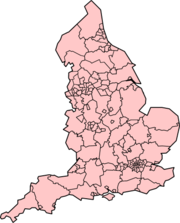 The creation of regional assemblies was to be tied to abolition of the existing two-tier structure for local government
The creation of regional assemblies was to be tied to abolition of the existing two-tier structure for local government
in these regions; and its replacement with a uniform system of unitary authorities
. In areas that currently have two-tier government (Cheshire
, County Durham
, Cumbria
, Lancashire
, North Yorkshire
, Northumberland
), voters were to be asked which pattern of unitary government they would like to see.
Two options were proposed by the Boundary Committee
for each county in the review area - generally consisting of a single unitary authority for the entire county, or a breakup into smaller authorities which are larger than the existing districts. It was recommended that ceremonial counties be left untouched in most cases. This recommendation was broadly (with one minor alteration in West Lancashire
) accepted by the Office of the Deputy Prime Minister.
Voting was to take place on a per-county council
-area basis, except that the Cumbria
and Lancashire
votes will be run as one — since it would be impossible to have option 1 in one and option 2 in another.
Any changes as a result of the North East referendum would probably have come into effect on 1 April 2006 — to give time for preparation, and taking into account 1 April as the traditional day of local government reform in the UK.
In Lancashire
and Cumbria
the proposals for multiple unitary authorities were very similar to those proposed by the Redcliffe-Maud Report
in 1969. This proposed authorities for North Cumbria based in Carlisle, and one for Morecambe Bay
covering Barrow-in-Furness
and Lancaster for the north of the region. In central Lancashire there were to be divided into four authorities based on Blackpool
, Preston, Blackburn and Burnley
. The area of West Lancashire
was to be given to Merseyside
and included with Southport
in a district.
The options were as follows:
Cheshire
County Durham
Cumbria
Lancashire
North Yorkshire
Northumberland
Yes: 197,310 (22.1%)
No: 696,519 (77.9%)
Rejected: 12,538
* Valid and rejected votes divided by electorate.
The related votes in Northumberland
and County Durham
on local government changes became moot, though new single merged unitary authorities were later established based on the county council areas (i.e. Option A in each case) as part of the 2009 structural changes to local government in England
. The votes had been
* Valid and rejected votes divided by electorate.
and Yorkshire and the Humber
. These were postponed on 22 July due to issues with all-postal ballots - there were many allegations of fraud and procedural irregularities. Following the rejection of the proposal in the north east of England the Deputy Prime Minister
John Prescott
at the time, ruled out holding further referendums in other regions for the foreseeable future.
Referendum
A referendum is a direct vote in which an entire electorate is asked to either accept or reject a particular proposal. This may result in the adoption of a new constitution, a constitutional amendment, a law, the recall of an elected official or simply a specific government policy. It is a form of...
s starting with the North East
North East England
North East England is one of the nine official regions of England. It covers Northumberland, County Durham, Tyne and Wear, and Teesside . The only cities in the region are Durham, Newcastle upon Tyne and Sunderland...
region
Regions of England
In England, the region is the highest tier of sub-national division used by central Government. Between 1994 and 2011, the nine regions had an administrative role in the implementation of UK Government policy, and as the areas covered by elected bodies...
of England, in the United Kingdom, on 4 November 2004. Dubbed by the government the Great North Vote, the referendum proposed that the region should have an elected regional assembly
Regional Assemblies in England
The Regional Assemblies of England were a group of indirectly elected regional bodies established originally under the name Regional Chambers by the Regional Development Agencies Act 1998. They were abolished on 31 March 2010 and replaced by Local Authority Leaders’ Boards...
. The voters rejected the proposal by 77.9%, also halting proposals to devolve power in other English regions: the similar planned votes in North West England
North West England
North West England, informally known as The North West, is one of the nine official regions of England.North West England had a 2006 estimated population of 6,853,201 the third most populated region after London and the South East...
and in Yorkshire and the Humber
Yorkshire and the Humber
Yorkshire and the Humber is one of the nine regions of England and formally one of the government office regions. It covers most of the historic county of Yorkshire, along with the part of northern Lincolnshire that was, from 1974 to 1996, within the former shire county of Humberside. The...
were postponed and then dropped.
Options put to vote

Local government in the United Kingdom
The pattern of local government in England is complex, with the distribution of functions varying according to the local arrangements. Legislation concerning local government in England is decided by the Parliament and Government of the United Kingdom, because England does not have a devolved...
in these regions; and its replacement with a uniform system of unitary authorities
Unitary authority
A unitary authority is a type of local authority that has a single tier and is responsible for all local government functions within its area or performs additional functions which elsewhere in the relevant country are usually performed by national government or a higher level of sub-national...
. In areas that currently have two-tier government (Cheshire
Cheshire
Cheshire is a ceremonial county in North West England. Cheshire's county town is the city of Chester, although its largest town is Warrington. Other major towns include Widnes, Congleton, Crewe, Ellesmere Port, Runcorn, Macclesfield, Winsford, Northwich, and Wilmslow...
, County Durham
County Durham
County Durham is a ceremonial county and unitary district in north east England. The county town is Durham. The largest settlement in the ceremonial county is the town of Darlington...
, Cumbria
Cumbria
Cumbria , is a non-metropolitan county in North West England. The county and Cumbria County Council, its local authority, came into existence in 1974 after the passage of the Local Government Act 1972. Cumbria's largest settlement and county town is Carlisle. It consists of six districts, and in...
, Lancashire
Lancashire
Lancashire is a non-metropolitan county of historic origin in the North West of England. It takes its name from the city of Lancaster, and is sometimes known as the County of Lancaster. Although Lancaster is still considered to be the county town, Lancashire County Council is based in Preston...
, North Yorkshire
North Yorkshire
North Yorkshire is a non-metropolitan or shire county located in the Yorkshire and the Humber region of England, and a ceremonial county primarily in that region but partly in North East England. Created in 1974 by the Local Government Act 1972 it covers an area of , making it the largest...
, Northumberland
Northumberland
Northumberland is the northernmost ceremonial county and a unitary district in North East England. For Eurostat purposes Northumberland is a NUTS 3 region and is one of three boroughs or unitary districts that comprise the "Northumberland and Tyne and Wear" NUTS 2 region...
), voters were to be asked which pattern of unitary government they would like to see.
Two options were proposed by the Boundary Committee
Boundary Committee for England
The Boundary Committee for England was a statutory committee of the Electoral Commission, an independent body set up by the UK Parliament. The Committee’s aim was to conduct thorough, consultative and robust reviews of local government areas in England, and for its recommendations to be...
for each county in the review area - generally consisting of a single unitary authority for the entire county, or a breakup into smaller authorities which are larger than the existing districts. It was recommended that ceremonial counties be left untouched in most cases. This recommendation was broadly (with one minor alteration in West Lancashire
West Lancashire
West Lancashire is a non-metropolitan district with the status of a borough in Lancashire, England. Its council is based in Ormskirk. The other town in the borough is Skelmersdale....
) accepted by the Office of the Deputy Prime Minister.
Voting was to take place on a per-county council
County council
A county council is the elected administrative body governing an area known as a county. This term has slightly different meanings in different countries.-United Kingdom:...
-area basis, except that the Cumbria
Cumbria
Cumbria , is a non-metropolitan county in North West England. The county and Cumbria County Council, its local authority, came into existence in 1974 after the passage of the Local Government Act 1972. Cumbria's largest settlement and county town is Carlisle. It consists of six districts, and in...
and Lancashire
Lancashire
Lancashire is a non-metropolitan county of historic origin in the North West of England. It takes its name from the city of Lancaster, and is sometimes known as the County of Lancaster. Although Lancaster is still considered to be the county town, Lancashire County Council is based in Preston...
votes will be run as one — since it would be impossible to have option 1 in one and option 2 in another.
Any changes as a result of the North East referendum would probably have come into effect on 1 April 2006 — to give time for preparation, and taking into account 1 April as the traditional day of local government reform in the UK.
In Lancashire
Lancashire
Lancashire is a non-metropolitan county of historic origin in the North West of England. It takes its name from the city of Lancaster, and is sometimes known as the County of Lancaster. Although Lancaster is still considered to be the county town, Lancashire County Council is based in Preston...
and Cumbria
Cumbria
Cumbria , is a non-metropolitan county in North West England. The county and Cumbria County Council, its local authority, came into existence in 1974 after the passage of the Local Government Act 1972. Cumbria's largest settlement and county town is Carlisle. It consists of six districts, and in...
the proposals for multiple unitary authorities were very similar to those proposed by the Redcliffe-Maud Report
Redcliffe-Maud Report
The Redcliffe–Maud Report is the name generally given to the report published by the Royal Commission on Local Government in England 1966–1969 under the chairmanship of Lord Redcliffe-Maud.-Terms of reference and membership:...
in 1969. This proposed authorities for North Cumbria based in Carlisle, and one for Morecambe Bay
Morecambe Bay
Morecambe Bay is a large bay in northwest England, nearly due east of the Isle of Man and just to the south of the Lake District National Park. It is the largest expanse of intertidal mudflats and sand in the United Kingdom, covering a total area of 310 km².-Natural features:The rivers Leven,...
covering Barrow-in-Furness
Barrow-in-Furness
Barrow-in-Furness is an industrial town and seaport which forms about half the territory of the wider Borough of Barrow-in-Furness in the county of Cumbria, England. It lies north of Liverpool, northwest of Manchester and southwest from the county town of Carlisle...
and Lancaster for the north of the region. In central Lancashire there were to be divided into four authorities based on Blackpool
Blackpool
Blackpool is a borough, seaside town, and unitary authority area of Lancashire, in North West England. It is situated along England's west coast by the Irish Sea, between the Ribble and Wyre estuaries, northwest of Preston, north of Liverpool, and northwest of Manchester...
, Preston, Blackburn and Burnley
Burnley
Burnley is a market town in the Burnley borough of Lancashire, England, with a population of around 73,500. It lies north of Manchester and east of Preston, at the confluence of the River Calder and River Brun....
. The area of West Lancashire
West Lancashire
West Lancashire is a non-metropolitan district with the status of a borough in Lancashire, England. Its council is based in Ormskirk. The other town in the borough is Skelmersdale....
was to be given to Merseyside
Merseyside
Merseyside is a metropolitan county in North West England, with a population of 1,365,900. It encompasses the metropolitan area centred on both banks of the lower reaches of the Mersey Estuary, and comprises five metropolitan boroughs: Knowsley, St Helens, Sefton, Wirral, and the city of Liverpool...
and included with Southport
Southport
Southport is a seaside town in the Metropolitan Borough of Sefton in Merseyside, England. During the 2001 census Southport was recorded as having a population of 90,336, making it the eleventh most populous settlement in North West England...
in a district.
The options were as follows:
CheshireCheshireCheshire is a ceremonial county in North West England. Cheshire's county town is the city of Chester, although its largest town is Warrington. Other major towns include Widnes, Congleton, Crewe, Ellesmere Port, Runcorn, Macclesfield, Winsford, Northwich, and Wilmslow...
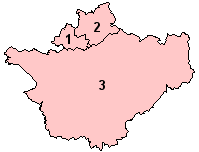 |
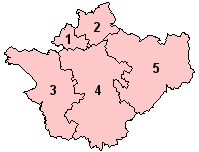 |
Option 1
|
Option 2
Halton (borough) Halton is a local government district in North West England, with borough status and administered by a unitary authority. It was created in 1974 as a district of Cheshire, and became a unitary authority area on 1 April 1998. It consists of the towns of Widnes and Runcorn and the civil parishes of... Warrington Warrington is a town, borough and unitary authority area of Cheshire, England. It stands on the banks of the River Mersey, which is tidal to the west of the weir at Howley. It lies 16 miles east of Liverpool, 19 miles west of Manchester and 8 miles south of St Helens... (Chester Chester (district) Chester was a non-metropolitan local government district of Cheshire, England, with the status of a city and a borough.Apart from Chester itself, which was the principal settlement, the district covered a large rural area... and Ellesmere Port and Neston Ellesmere Port and Neston Ellesmere Port and Neston was, from 1974 to 2009, a local government district with borough status in Cheshire, England. It covered the southern part of the Wirral Peninsula, namely that part which is not included in the Metropolitan Borough of Wirral.... ) (Vale Royal Vale Royal Vale Royal was, from 1974 to 2009, a local government district with borough status in Cheshire, England. It contained the towns of Northwich, Winsford and Frodsham.-Creation:... and Crewe and Nantwich Crewe and Nantwich Crewe and Nantwich was, from 1974 to 2009, a local government district with borough status in Cheshire, England. It had a population of 111,007... ) (Congleton Congleton (borough) Congleton was, from 1974 to 2009, a local government district with borough status in Cheshire, England. It included the towns of Congleton, Alsager, Holmes Chapel, Middlewich and Sandbach... and Macclesfield Macclesfield (borough) Macclesfield was, from 1974 to 2009, a local government district with borough status in Cheshire, England. It included the towns of Bollington, Knutsford, Macclesfield and Wilmslow and within its wider area the villages and hamlets of Adlington, Disley, Gawsworth, Kerridge, Pott Shrigley, Poynton,... ) |
County DurhamCounty DurhamCounty Durham is a ceremonial county and unitary district in north east England. The county town is Durham. The largest settlement in the ceremonial county is the town of Darlington...
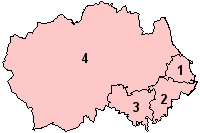 |
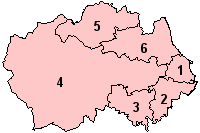 |
Option A
|
Option B
Hartlepool (borough) Hartlepool is a unitary authority in the ceremonial county of County Durham, north east England. In 2003 it had a resident population of 90,161. It borders the non-metropolitan county of County Durham to the north, Stockton-on-Tees to the south and Redcar and Cleveland to the south-east along the... Stockton-on-Tees (borough) Stockton-on-Tees is a unitary authority area and borough in the Tees Valley area of north east England, with a population in 2001 of 178,408, rising to 185,880 in 2005 estimates.... Darlington (borough) Darlington is a local government district and borough in North East England. In 2008 it had a resident population of 100,500 It borders County Durham to the north and west, North Yorkshire to the south along the line of the River Tees, and Stockton-on-Tees to the east.-Council:Traditionally part of... (Sedgefield Sedgefield (borough) Sedgefield was, from 1974 to 2009, a local government district and borough in County Durham, in North East England. It had a population of about 87,000 . It was named after Sedgefield; but its largest town was Newton Aycliffe... , Teesdale Teesdale (district) Teesdale was, from 1974 to 2009, a local government district in County Durham, England. Its council was based in Barnard Castle and it was named after the valley of the River Tees.... and Wear Valley Wear Valley Wear Valley was, from 1974 to 2009, a local government district in County Durham, England. Its council was based in Crook.The district covered much of the Weardale area. In the west it was parished and rural, whereas in the east it was more urban... ) (Chester-le-Street Chester-le-Street (district) Chester-le-Street was a local government district in County Durham, England. Its council was based in Chester-le-Street. Other places in the district included Great Lumley and Sacriston.- Formation :... and Derwentside Derwentside Derwentside was, from 1974 to 2009, a local government district in County Durham, England.The district took its name from the River Derwent, which made up part of the northern border of the district. Its main towns were Consett and Stanley, with the district council offices on Consett's Medomsley... ) (Durham and Easington Easington (district) Easington was, from 1974 to 2009, a local government district in eastern County Durham, England. It contained the settlements of Easington, Seaham, Peterlee, Murton, Horden, Blackhall, Wingate and Castle Eden... ) |
CumbriaCumbriaCumbria , is a non-metropolitan county in North West England. The county and Cumbria County Council, its local authority, came into existence in 1974 after the passage of the Local Government Act 1972. Cumbria's largest settlement and county town is Carlisle. It consists of six districts, and in...
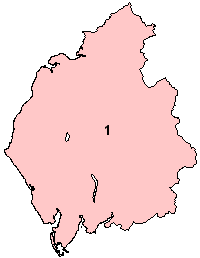 |
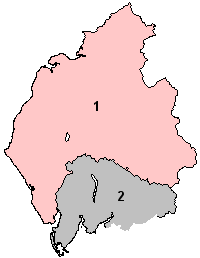 |
Option 1
|
Option 2
(Allerdale Allerdale Allerdale is a non-metropolitan district of Cumbria, England, with borough status. Its council is based in Workington and the borough has a population of 93,492 according to the 2001 census.... , Carlisle City of Carlisle The City of Carlisle is a local government district of Cumbria, England, with the status of a city and non-metropolitan district. It is named after its largest settlement, Carlisle, but covers a far larger area which includes the towns of Brampton and Longtown, as well as outlying villages... , Copeland Copeland, Cumbria Copeland is a local government district and borough in western Cumbria, England. Its council is based in Whitehaven. It was formed on 1 April 1974 by the merger of the borough of Whitehaven, Ennerdale Rural District and Millom Rural District.... and Eden Eden, Cumbria Eden is a local government district in Cumbria, England. Its council is based in Penrith. It is named after the River Eden which flows north through the district toward Carlisle.... ) (Barrow-in-Furness Barrow-in-Furness (borough) Barrow-in-Furness is a local government district with borough status in Cumbria, England. It is named after its main town, Barrow-in-Furness. Other settlements include Dalton-in-Furness, Roose and Askam-in-Furness. It is the smallest borough in the county, but is the most densely populated, with... , South Lakeland South Lakeland South Lakeland is a local government district in Cumbria, England. Its council is based in Kendal. It includes much of the Lake District.The district was created on 1 April 1974 under the Local Government Act 1972... , and Lancaster City of Lancaster The City of Lancaster , is a local government district of Lancashire, England, with the status of a city and non-metropolitan district. It is named after its largest settlement, Lancaster, but covers a far larger area which includes the towns of Morecambe, Heysham, and Carnforth, as well as... from Lancashire Lancashire Lancashire is a non-metropolitan county of historic origin in the North West of England. It takes its name from the city of Lancaster, and is sometimes known as the County of Lancaster. Although Lancaster is still considered to be the county town, Lancashire County Council is based in Preston... ) |
LancashireLancashireLancashire is a non-metropolitan county of historic origin in the North West of England. It takes its name from the city of Lancaster, and is sometimes known as the County of Lancaster. Although Lancaster is still considered to be the county town, Lancashire County Council is based in Preston...
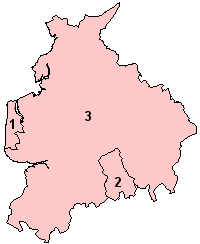 |
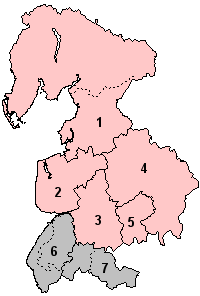 |
Option 1
|
Option 2
Morecambe Bay Morecambe Bay is a large bay in northwest England, nearly due east of the Isle of Man and just to the south of the Lake District National Park. It is the largest expanse of intertidal mudflats and sand in the United Kingdom, covering a total area of 310 km².-Natural features:The rivers Leven,... (Lancaster City of Lancaster The City of Lancaster , is a local government district of Lancashire, England, with the status of a city and non-metropolitan district. It is named after its largest settlement, Lancaster, but covers a far larger area which includes the towns of Morecambe, Heysham, and Carnforth, as well as... with South Lakeland South Lakeland South Lakeland is a local government district in Cumbria, England. Its council is based in Kendal. It includes much of the Lake District.The district was created on 1 April 1974 under the Local Government Act 1972... and Barrow-in-Furness Barrow-in-Furness (borough) Barrow-in-Furness is a local government district with borough status in Cumbria, England. It is named after its main town, Barrow-in-Furness. Other settlements include Dalton-in-Furness, Roose and Askam-in-Furness. It is the smallest borough in the county, but is the most densely populated, with... from Cumbria Cumbria Cumbria , is a non-metropolitan county in North West England. The county and Cumbria County Council, its local authority, came into existence in 1974 after the passage of the Local Government Act 1972. Cumbria's largest settlement and county town is Carlisle. It consists of six districts, and in... ) (Blackpool Blackpool Blackpool is a borough, seaside town, and unitary authority area of Lancashire, in North West England. It is situated along England's west coast by the Irish Sea, between the Ribble and Wyre estuaries, northwest of Preston, north of Liverpool, and northwest of Manchester... , Wyre Wyre Wyre is a local government district with borough status in Lancashire, England. Its council is based in Poulton-le-Fylde.The district is named after the River Wyre, which runs through the district... and Fylde) (Preston, South Ribble South Ribble South Ribble is a non-metropolitan district and borough of Lancashire, England. Its council is based in Leyland.In May 2007, the council was officially declared "Excellent" by the Audit Commission, gaining its place among the best 5 district councils in the country,-Overview:On 4 October 2007, a... and Chorley Chorley (borough) Chorley is a local government district with borough status in Lancashire, England. It is named after its largest settlement, the town of Chorley.-Creation:... ) (Burnley Burnley (borough) Burnley is a local government district of Lancashire, England, with the status of a non-metropolitan district and borough. It has an area of and a population of , and is named for its largest town, Burnley. The borough is bounded by Hyndburn, Ribble Valley, Pendle, Rossendale — all in Lancashire... , Pendle Pendle Pendle is a local government district and borough of Lancashire, England. It adjoins the Lancashire boroughs of Burnley and Ribble Valley, the North Yorkshire district of Craven and the West Yorkshire districts of Calderdale and the City of Bradford... , Ribble Valley Ribble Valley Ribble Valley is a local government district with borough status within the non-metropolitan county of Lancashire, England. Its council is based in Clitheroe. Other places include Whalley, Longridge and Ribchester. The area is so called due to the River Ribble which flows in its final stages... and Rossendale Rossendale Rossendale is a local government district with borough status. It is made up of a number of small former mill towns in Lancashire, England centered around the valley of the River Irwell in the industrial North West... ) (Blackburn with Darwen Blackburn with Darwen Blackburn with Darwen is a unitary authority area in Lancashire, North West England. It consists of Blackburn, the small town of Darwen to the south of it, and the surrounding countryside.-Formation:... and Hyndburn Hyndburn Hyndburn is a local government district with borough status in Lancashire, England. Its council is based in Accrington. The district is named after the River Hyndburn.... ) (Sefton from Merseyside Merseyside Merseyside is a metropolitan county in North West England, with a population of 1,365,900. It encompasses the metropolitan area centred on both banks of the lower reaches of the Mersey Estuary, and comprises five metropolitan boroughs: Knowsley, St Helens, Sefton, Wirral, and the city of Liverpool... , with part of West Lancashire West Lancashire West Lancashire is a non-metropolitan district with the status of a borough in Lancashire, England. Its council is based in Ormskirk. The other town in the borough is Skelmersdale.... ) (Wigan from Greater Manchester Greater Manchester Greater Manchester is a metropolitan county in North West England, with a population of 2.6 million. It encompasses one of the largest metropolitan areas in the United Kingdom and comprises ten metropolitan boroughs: Bolton, Bury, Oldham, Rochdale, Stockport, Tameside, Trafford, Wigan, and the... , with part of West Lancashire West Lancashire West Lancashire is a non-metropolitan district with the status of a borough in Lancashire, England. Its council is based in Ormskirk. The other town in the borough is Skelmersdale.... ) |
North YorkshireNorth YorkshireNorth Yorkshire is a non-metropolitan or shire county located in the Yorkshire and the Humber region of England, and a ceremonial county primarily in that region but partly in North East England. Created in 1974 by the Local Government Act 1972 it covers an area of , making it the largest...
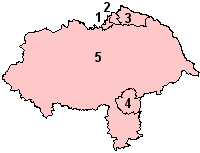 |
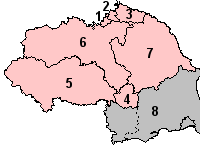 |
Option 1
|
Option 2
Stockton-on-Tees (borough) Stockton-on-Tees is a unitary authority area and borough in the Tees Valley area of north east England, with a population in 2001 of 178,408, rising to 185,880 in 2005 estimates.... Middlesbrough (borough) -External links:*... Redcar and Cleveland The borough of Redcar & Cleveland is a unitary authority in the ceremonial county of North Yorkshire, England consisting of Redcar, Saltburn-by-the-Sea, Guisborough, and small towns such as Brotton, Eston, Skelton and Loftus. It had a resident population of 139,132 in 2001, and is part of the Tees... York York is a walled city, situated at the confluence of the Rivers Ouse and Foss in North Yorkshire, England. The city has a rich heritage and has provided the backdrop to major political events throughout much of its two millennia of existence... Craven Craven is a local government district in North Yorkshire, England that came into being in 1974, centred on the market town of Skipton. In the changes to British local government of that year this district was formed as the merger of Skipton urban district, Settle Rural District and most of Skipton... and Harrogate Harrogate (borough) Harrogate is a local government district and borough of North Yorkshire, England. Its council is based in the town of Harrogate but it also includes surrounding towns and villages... Hambleton Hambleton is a local government district of North Yorkshire, England. The main town and administrative centre is Northallerton, and includes the market towns and major villages of Bedale, Thirsk, Great Ayton, Stokesley and Easingwold.... and Richmondshire Richmondshire Richmondshire is a local government district of North Yorkshire, England. It covers a large northern area of the Yorkshire Dales including Swaledale and Arkengarthdale, Wensleydale and Coverdale, with the prominent Scots' Dyke and Scotch Corner along the centre. Teesdale lies to the north... Ryedale Ryedale is a non-metropolitan district of the shire county of North Yorkshire in England. Settlements include Helmsley, Kirkbymoorside, Malton, Norton-on-Derwent, Pickering, and Terrington.-Derivation of name:... and Scarborough Scarborough (borough) Scarborough is a non-metropolitan district and borough of North Yorkshire, England. In addition to the town of Scarborough, it covers a large stretch of the coast of Yorkshire, including Whitby and Filey.... East Riding of Yorkshire The East Riding of Yorkshire, or simply East Yorkshire, is a local government district with unitary authority status, and a ceremonial county of England. For ceremonial purposes the county also includes the city of Kingston upon Hull, which is a separate unitary authority... (existing East Riding of Yorkshire East Riding of Yorkshire The East Riding of Yorkshire, or simply East Yorkshire, is a local government district with unitary authority status, and a ceremonial county of England. For ceremonial purposes the county also includes the city of Kingston upon Hull, which is a separate unitary authority... with Selby Selby (district) Selby is a local government district of North Yorkshire, England. The local authority, Selby District Council, is based in the town of Selby and provides services to an area which includes Tadcaster and a host of villages.... ) |
NorthumberlandNorthumberlandNorthumberland is the northernmost ceremonial county and a unitary district in North East England. For Eurostat purposes Northumberland is a NUTS 3 region and is one of three boroughs or unitary districts that comprise the "Northumberland and Tyne and Wear" NUTS 2 region...
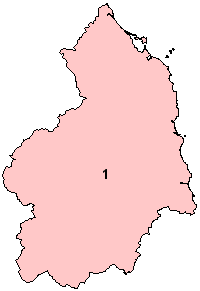 |
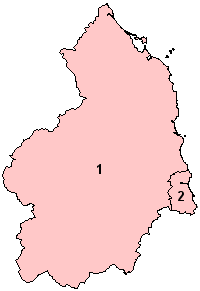 |
Option A
|
Option B
(Alnwick Alnwick (district) Alnwick was a local government district of Northumberland, England. Its council was based in Alnwick town and the district had a population of 31,029 according to the 2001 census.... , Berwick-upon-Tweed Berwick-upon-Tweed (borough) Berwick-upon-Tweed was a local government district and borough in Northumberland in the north-east of England, on the border with Scotland. The district had a resident population of 25,949 according to the 2001 census, which also notes that it is the most ethnically homogeneous in the country, with... , Castle Morpeth Castle Morpeth Castle Morpeth was a local government district and borough in Northumberland, England. Its administrative centre was the town of Morpeth.The district was formed on 1 April 1974 by the merger of the borough of Morpeth and Morpeth Rural District, along with part of Castle Ward Rural District.The... and Tynedale Tynedale Tynedale was a local government district in south-west Northumberland, England. It had a resident population of 58,808 according to the 2001 Census, and was named after the River Tyne . Its main towns were Hexham, Haltwhistle and Prudhoe... ) (Blyth Valley Blyth Valley Blyth Valley was a Local government district and borough in south-east Northumberland, England, bordering the North Sea and Tyne and Wear. The two principal towns were Blyth and Cramlington... and Wansbeck Wansbeck Wansbeck was a local government district in south-east Northumberland, England. Its main population centres were Ashington, Bedlington and Newbiggin-by-the-Sea.... ) |
The result - North East England
On 4 November 2004, in a turnout of almost 48% using a postal ballot, voters in the North East decisively rejected the proposed regional assembly. The reasons for this result are varied, however it is felt that the regional power would have been concentrated in an Assembly situated in Newcastle-upon-Tyne, which given the strong historic rivalries between urban centres in the North-East was an unpopular choice of venue. It vehemently supported by the dignitaries of Newcastle itself, which created further tensions. Notwithstanding this, in the Newcastle-upon-Tyne local authority area itself the majority of votes cast were against the proposal. It was also felt that not enough of a case had been put forward for the necessity of the Assembly, and it was feared that it would add another layer of politicians and public servants, thereby increasing taxes for the citizens of the areas affected.Yes: 197,310 (22.1%)
No: 696,519 (77.9%)
Rejected: 12,538
| Local authority | Yes | No | Turnout* |
|---|---|---|---|
| Alnwick | 2,771 | 11,666 | 57.4% |
| Berwick-upon-Tweed | 2,250 | 8,597 | 52.3% |
| Blyth Valley | 7,523 | 21,178 | 45.5% |
| Castle Morpeth | 4,776 | 16,952 | 57.2% |
| Chester-le-Street | 5,487 | 15,610 | 49.5% |
| Darlington | 4,784 | 32,282 | 49.0% |
| Derwentside | 9,718 | 22,888 | 49.1% |
| Durham | 9,791 | 24,106 | 48.3% |
| Easington | 8,065 | 21,520 | 42.5% |
| Gateshead | 17,011 | 52,459 | 49.3% |
| Hartlepool | 4,887 | 24,240 | 42.9% |
| Middlesbrough | 7,977 | 33,543 | 42.1% |
| Newcastle upon Tyne | 19,984 | 61,477 | 46.4% |
| North Tyneside | 15,203 | 55,121 | 50.7% |
| Redcar & Cleveland | 8,493 | 43,250 | 50.6% |
| Sedgefield | 9,040 | 23,583 | 48.3% |
| South Tyneside | 11,329 | 41,029 | 46.3% |
| Stockton-on-Tees | 11,050 | 52,040 | 48.3% |
| Sunderland | 17,927 | 71,893 | 43.4% |
| Teesdale | 2,020 | 8,972 | 56.9% |
| Tynedale | 5,146 | 20,975 | 55.4% |
| Wansbeck | 5,947 | 15,503 | 46.6% |
| Wear Valley | 6,131 | 17,635 | 49.9% |
| Totals | 197,310 | 696,519 | 47.7% |
* Valid and rejected votes divided by electorate.
The related votes in Northumberland
Northumberland
Northumberland is the northernmost ceremonial county and a unitary district in North East England. For Eurostat purposes Northumberland is a NUTS 3 region and is one of three boroughs or unitary districts that comprise the "Northumberland and Tyne and Wear" NUTS 2 region...
and County Durham
County Durham
County Durham is a ceremonial county and unitary district in north east England. The county town is Durham. The largest settlement in the ceremonial county is the town of Darlington...
on local government changes became moot, though new single merged unitary authorities were later established based on the county council areas (i.e. Option A in each case) as part of the 2009 structural changes to local government in England
2009 structural changes to local government in England
Structural changes to local government in England were effected on 1 April 2009, whereby a number of new unitary authorities were created in parts of the country which previously operated a 'two-tier' system of counties and districts...
. The votes had been
| County | Option A | Option B | Turnout* |
|---|---|---|---|
| County Durham | 89,149 | 87,050 | 47.1% |
| Northumberland | 51,560 | 66,140 | 50.2% |
* Valid and rejected votes divided by electorate.
Future
Similar referendums had been planned in North West EnglandNorth West England
North West England, informally known as The North West, is one of the nine official regions of England.North West England had a 2006 estimated population of 6,853,201 the third most populated region after London and the South East...
and Yorkshire and the Humber
Yorkshire and the Humber
Yorkshire and the Humber is one of the nine regions of England and formally one of the government office regions. It covers most of the historic county of Yorkshire, along with the part of northern Lincolnshire that was, from 1974 to 1996, within the former shire county of Humberside. The...
. These were postponed on 22 July due to issues with all-postal ballots - there were many allegations of fraud and procedural irregularities. Following the rejection of the proposal in the north east of England the Deputy Prime Minister
Deputy Prime Minister of the United Kingdom
The Deputy Prime Minister of the United Kingdom of Great Britain and Northern Ireland is a senior member of the Cabinet of the United Kingdom. The office of the Deputy Prime Minister is not a permanent position, existing only at the discretion of the Prime Minister, who may appoint to other offices...
John Prescott
John Prescott
John Leslie Prescott, Baron Prescott is a British politician who was Deputy Prime Minister of the United Kingdom from 1997 to 2007. Born in Prestatyn, Wales, he represented Hull East as the Labour Member of Parliament from 1970 to 2010...
at the time, ruled out holding further referendums in other regions for the foreseeable future.

